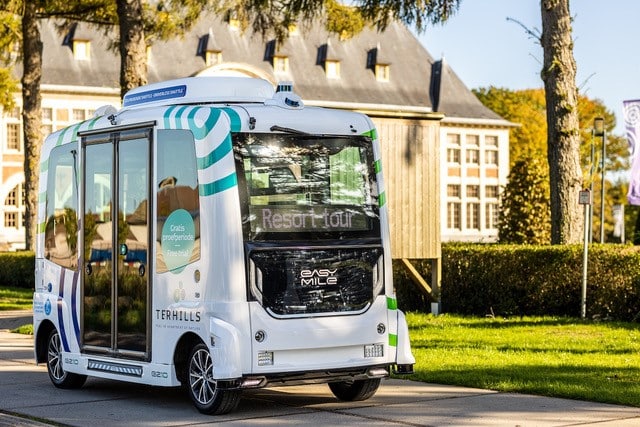The shuttles will run 7 days a week, for up to 10 years.
The new service includes a complete transport system, validated safety, and progression to Level 4 of autonomous driving (completely removing any human supervisor from onboard). It is unique as a commercial response to a mobility need, and in its longevity. This is a further signal of maturity in the demand for autonomous shuttles. EasyMile came out on top of a European tender process, undergoing a thorough technical, financial and legal assessment.
The autonomous service will be offered Monday through Friday from 9 a.m. to 4 p.m. between Donaupark, Old Town and the Pflegerspitz parking lot. The service connects the old town of Kelheim with the Donaupark commercial area and serves a road network of almost 14 km in length. The vehicles will travel at a maximum speed of 20 km/h. Rides in the autonomous vehicles will be free.
The shuttles will cover a 2.5 km route connecting the attractions of the Terhills Hotel, to the Terhills Resort and the future walking and cycling bridge over the large lake. They will initially run for 8 hours a day (with the ability to extend this), with the waiting time for passengers at the various stops a maximum of 10 minutes. The system can be expanded to 5 or 6 shuttles, with each stop served every 4 minutes during the busiest hours of the day. This will be thanks to a smart fleet management and booking tool developed by Ush. They are a Belgian company belonging to the Lab Box start-up studio supported by D’Ieteren Automotive, and have been part of all autonomous shuttles deployments on public roads in the country.
The fleet of driverless shuttles meets the site’s need for efficient mobility. They will also replace the current, conventional electric bus on the site that suffers a low frequency, and isn’t being used enough. The overall business case is expected to be competitive.
Tim De Ceunynck, Project Manager Mobility at LRM: “This project is unique thanks to two core ambitions: fully driverless and long-term. We will collect user data and feedback from users to substantiate the business case. We expect the system to be competitive with a classic manned bus. Around the summer of 2023, we will decide on the final outline for the transport system for a period of 10 years on the basis of all this information. The providers’ commitment to providing a schedule-bound transport system for such a long period of time is exceptional.”
EasyMile has won a project worth €4 million for a fleet of autonomous shuttles at Belgian tourist site Terhills. The shuttles will run 7 days a week, for up to 10 years. The new service includes a complete transport system, validated safety, and progression to Level 4 of autonomous driving (completely removing any human supervisor from onboard). It is unique as a commercial response to a mobility need, and in its longevity. This is a further signal of maturity in the demand for autonomous shuttles. EasyMile came out on top of a European tender process, undergoing a thorough technical, financial and legal assessment.
The autonomous service will be offered Monday through Friday from 9 a.m. to 4 p.m. between Donaupark, Old Town and the Pflegerspitz parking lot. The service connects the old town of Kelheim with the Donaupark commercial area and serves a road network of almost 14 km in length. The vehicles will travel at a maximum speed of 20 km/h. Rides in the autonomous vehicles will be free.
The shuttles will cover a 2.5 km route connecting the attractions of the Terhills Hotel, to the Terhills Resort and the future walking and cycling bridge over the large lake. They will initially run for 8 hours a day (with the ability to extend this), with the waiting time for passengers at the various stops a maximum of 10 minutes. The system can be expanded to 5 or 6 shuttles, with each stop served every 4 minutes during the busiest hours of the day. This will be thanks to a smart fleet management and booking tool developed by Ush. They are a Belgian company belonging to the Lab Box start-up studio supported by D’Ieteren Automotive, and have been part of all autonomous shuttles deployments on public roads in the country.
The fleet of driverless shuttles meets the site’s need for efficient mobility. They will also replace the current, conventional electric bus on the site that suffers a low frequency, and isn’t being used enough. The overall business case is expected to be competitive.
Tim De Ceunynck, Project Manager Mobility at LRM: “This project is unique thanks to two core ambitions: fully driverless and long-term. We will collect user data and feedback from users to substantiate the business case. We expect the system to be competitive with a classic manned bus. Around the summer of 2023, we will decide on the final outline for the transport system for a period of 10 years on the basis of all this information. The providers’ commitment to providing a schedule-bound transport system for such a long period of time is exceptional.”



